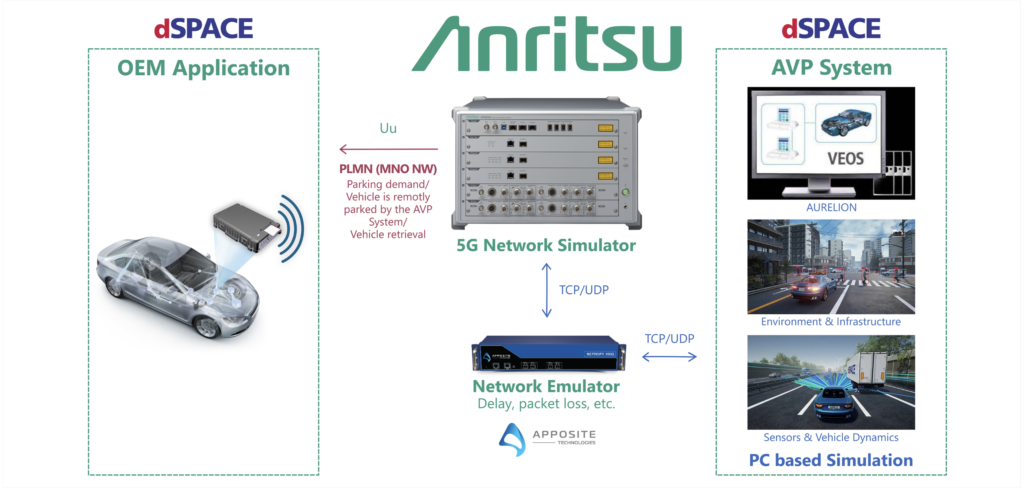Anritsu Corporation has developed a test and simulation environment for automated valet parking (AVP) in collaboration with dSpace and Apposite Technologies.
dSpace’s software-based tool integrates and simulates environment, infrastructure, sensor and vehicle information on a PC. In this demonstration, an AVP System was installed. Vehicle motion control commands (VMC) generated by the AVP system are transmitted to the OEM application, which displays the state of vehicle control, via 5G communication using Anritsu’s 5G base station simulator.
VMC commands pass through the Apposite network emulator on the way to the OEM application. IP data delay and data packet loss are added by the emulator, so vehicle control becomes unstable due to its influence on the OEM application. AVP developers design control systems and networks to keep vehicle control stable.
A virtual vehicle that has received vehicle motion control (VMC) commands across the 5G network automatically drives in a parking lot according to control instructions sent by the parking garage. The base station simulator radio communication test station MT8000A is a test platform that provides network simulation for 5G radio access technology (RAT*6) and provides a development evaluation and certification test environment for automotive use cases such as telematics, infotainment and V2X.
AVP is being developed as an autonomous driving use case that can be deployed in the short term. AVP Type-1 autonomous driving vehicles require expensive high-performance computing and sensing, while AVP Type-2 communication-cooperative vehicles do not require such installations, reducing vehicle costs and making implementation easier. A demonstration exhibition was held as part of the 5GAA*1 Member Symposium event in Malaga, Spain on October 20. AVP Technical Report Version 1.0 was released by 5GAA in June 2022, and a wireless communication (Type-2) operation scheme linked with parking garage infrastructure and users’ smartphones was proposed.
Since AVP Type-2 requires highly reliable end-to-end communications, a test system needs to evaluate the quality of service (QoS) management and impairment effects in the internet protocol (IP) layer. The wireless connectivity environment also needs to be evaluated. The test solution set up a digital twin environment incorporating virtual and real devices. This enables the system tests and certification required to improve the reliability of AVP Type-2 to begin before the actual devices are available.


